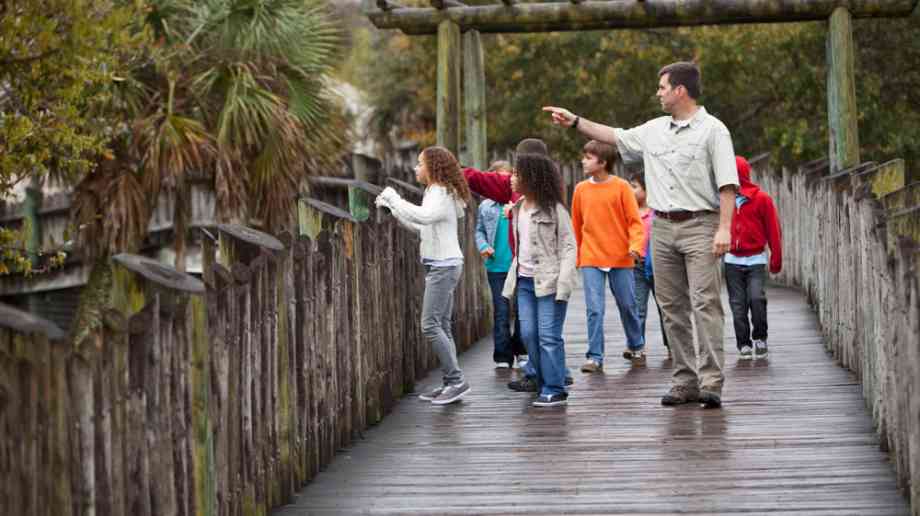
School trips – plan ahead to reduce the stress
There’s a lot to think about when planning an educational visit or trip – from selecting the right location or destination to organising transport and collecting money from families. This can be seen as stressful and time-consuming. However, the longer you have to plan, the less stressful the process will be. Justine Lee from The School Travel Forum shares some advice
For your pupils, planning well in advance will give families more time to budget, and they will be able to pay in smaller instalments. For you, it means you can consider what you want to achieve through the experience, identify the best location for this, secure a travel provider or tour organiser that’s right for your group and take advantage of early booking discounts.
For many UK trips, planning six to nine months ahead is usually sufficient. For a trip overseas, nine to eighteen months is recommended, although some adventurous or long-haul trips may need 24 months planning to ensure they are delivered successfully.
This means that for a trip in June or July, you really should start planning in January. Here are the seven stages to consider when organising your educational visit.
Decide what you want to achieve
Write down your objectives for the visit or trip. What do you want to achieve? It could be to focus on one area of your curriculum – to provide a broader understanding of a subject, or you might want to combine different subject areas to get more value from the experience. Alternatively, you might want to concentrate on developing core skills such as leadership and communication. Also, think about budget and your preferred mode of transport.
By writing this down, you’ll start to develop a clear idea about the kind of trip or visit that would be best for your group.
Decide where to go
The first thing to consider is where to go. If this is your first time organising a trip, talk to your colleagues, find out what has been done in the past and how effective those trips were. Consult your school’s educational visits coordinator or get in touch with your region’s outdoor education adviser. They have considerable experience in organising off-site educational visits and may be able to suggest suitable venues, providers or locations.
A specialist school travel or tour provider, such as a member of the School Travel Forum, can be helpful too. Their staff have decades of experience in organising school visits and trips, as well as being able to answer your questions they can suggest options you may not have thought of. They will share what other teachers have chosen to do and provide feedback from other groups.
Decide when to go
Is summer the best time for your trip? Many schools set aside a ‘residential’ or ‘activity’ week which is usually in the final few weeks of the academic year. While this can make lesson planning and staffing considerably easier, think whether this really is the best time for what you want to achieve.
As the Learning Away research concluded, school trips and residentials offer powerful learning opportunities so running these experiences in the dying days of an academic year just as your pupils are about to head off on the long summer holidays means you don’t have the chance to capitalise or build on the learnings and relationships developed during the trip. Organising a visit or residential during the autumn or spring term gives you more time to integrate the experience into the curriculum. It can also be cheaper or give pupils experiences that aren’t possible during the summer months.
Tell your colleagues
A stage that can often be forgotten. Involve your teaching assistant(s) in the decision-making and planning. This can help them feel included and part of the trip. It will also give you time to build their needs into the arrangements. Remember also to let your colleagues in the wider staff team know. They may need time to adjust what they are teaching to accommodate pupils who will miss lessons and/or ensure any trips they have in mind don’t conflict or clash with what you are organising.
Choose the right venue or provider
Planning well in advance will give you the time to find a tour provider that you trust, that understands your and your students’ needs and can recommend how to get the most from your trip.
If you are organising an educational visit within the UK you should look for a company or provider that holds the LOtC Quality Badge. The Department for Education recommends that schools organising off-site visits and trips use organisations holding this accreditation as it is the only accreditation that covers risk management as well as the quality of learning.
For trips overseas look for a company that has the LOTC Quality Badge and is a member of ABTA – all School Travel Forum members hold these accreditations to give you and your group maximum protection regarding your booking. Members of the School Travel Forum are also regularly audited for health and safety and risk management, giving you complete confidence.
Get approval
You will need to get approval for your visit from your senior leader and/or your educational visits coordinator. Depending on the process in your school, either you or your EVC will need to log the trip on Evolve, the school online trip management system. This involves completing a form with information about the trip - group leader name, number of children travelling, name of external provider, learning objectives for the trip, destination etc. You will also need to attach copies of risk assessments and letters being sent to families.
Once completed, the information will be checked by your region’s outdoor education adviser who will approve it and return it to your school for your headteacher to approve. This process can take several weeks or even months so starting planning early will give you plenty of time to collate the required information and to receive approval.
Notify parents
As you are taking children off-site you will need parent/guardian permission. You may also need to collect monies from them for the trip. As mentioned earlier, giving families more time to save and/or make regular small deposits can help to keep the trip affordable. This is even more necessary when families have multiple children to consider.
It is important to keep parents on board and onside throughout the planning process. Families need to feel confident that their child, however old they are, will be safe, happy and looked after on the trip. Some children may have additional needs that need to be considered. By allowing enough time in the planning process, you will be able to make sure all pupils are able to take part and enjoy the experience.
The most successful trips are those that are thoroughly planned - knowing what you want to achieve from the trip, connecting the experience to classroom-based learning and considering the safety and wellbeing of pupils whilst in your care. And by planning ahead you’ll be confident that all areas of the trip are covered, so you can get excited and enjoy the experience as much as your students.
Latest News
21/11/2025 - 09:37
The framework provides a practical guide to integrating education and health for better outcomes for children and young people.
20/11/2025 - 10:42
Parents will be able to get Enhanced Disclosure and Barring Service (DBS) checks when hiring private tutors, carers and therapists, among others.
20/11/2025 - 10:37
The government is funding research into developing smarter data tools to help identify children with special educational needs sooner.
20/11/2025 - 09:48
The programme prioritises schools with the highest proportion of pupils on free school meals to ensure the benefits are felt where it is most needed.
19/11/2025 - 09:41
Skills England has announced that development of the second round of Local Skills Improvement Plans (LSIPs) is now underway and has published guidance to steer the process







